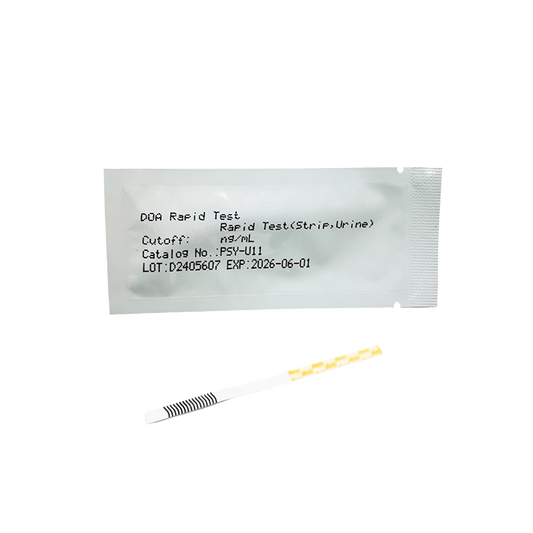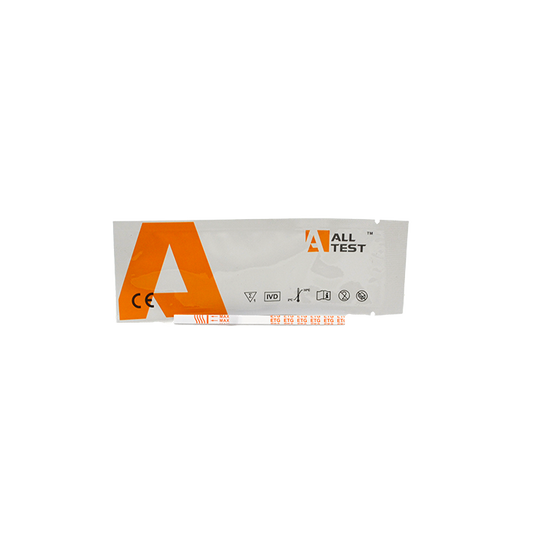Dextromethorphan
If you’ve recently taken a drug test, whether at home, in the workplace, or through a clinic, you may have seen the abbreviation “DXM” appear on your test results. But what does DXM mean, and why is it something people are testing for?
DXM stands for Dextromethorphan, an active ingredient found in many over-the-counter cough and cold medicines. When used correctly, DXM helps to relieve coughing. However, when taken in large doses or misused recreationally, it can produce powerful psychoactive effects. In this article, we’ll explain what DXM is, why people abuse it, the dangers involved, and how modern drug testing kits can accurately detect it including details about lean tests and DXM detection strips.

Dextromethorphan Drug Test - Cough Medicine DXM
Test for lean and cough medicine use.
What Is Dextromethorphan (DXM)?
Dextromethorphan, often shortened to DXM, is a synthetic cough suppressant used in hundreds of non-prescription medicines. It’s commonly found in products such as Robitussin, Benylin, Night Nurse, and Covonia. In therapeutic doses, DXM reduces the brain’s urge to cough. However, at much higher levels, it acts as a dissociative hallucinogen, similar in effect to ketamine or PCP.
Recreational users sometimes take DXM in excessive quantities to experience euphoria, visual distortions, or an altered sense of time and space a behaviour often called “robotripping” or “syruping.” This misuse can be extremely dangerous and is increasingly being detected through DXM drug tests and lean testing kits available in the UK.
Common Sources of DXM and “Lean” Abuse
DXM is widely available in cough syrups, cold medicines, and capsules, making it one of the easiest substances to access. Some people mix DXM-containing cough syrups with soft drinks or sweets to make a recreational concoction known as “lean” or “purple drank.”
Frequent sources of DXM include:
- Robitussin Dry Cough
- Benylin Cough Medicine
- Vicks Formula 44
- Night Nurse and Day Nurse
- Covonia Dry Cough Syrup
- Over-the-counter cold and flu capsules
Because these medicines are legal and inexpensive, misuse is often overlooked until symptoms become severe highlighting the importance of accurate drug testing kits for DXM and lean.
The Dangers of DXM Misuse
When taken in recommended doses, DXM is safe and effective. However, consuming high amounts can be extremely harmful. The risks include:
- Hallucinations and disorientation
- Loss of coordination and delayed reaction time
- Rapid heartbeat and raised blood pressure
- Nausea, vomiting, and abdominal pain
- Seizures and coma at very high doses
- Liver damage (especially when mixed with paracetamol-based medicines)
Long-term DXM abuse may cause depression, anxiety, memory problems, and dependency. Combining DXM with alcohol, antidepressants, or other drugs greatly increases the danger of serotonin syndrome, a potentially fatal condition.
Why Use a DXM Drug Testing Kit?
Home Testing
Parents may use home drug testing kits if they notice signs of cough syrup misuse or missing medicine bottles. Because DXM is legal and easily accessible, teenagers often experiment with it before moving on to stronger substances. Early testing allows for quick intervention and prevention.
Workplace Testing
While DXM itself is legal, misuse can cause serious impairment and slow reaction times, creating risks in safety-critical industries such as construction, healthcare, and transport. Some UK employers include DXM testing as part of broader workplace drug screening programmes.
Clinical or Rehabilitation Testing
DXM and lean testing is also used in rehabilitation centres, youth programmes, and mental health services to monitor recovery and detect relapse. Because standard drug panels don’t always include DXM, clinics often use expanded panels specifically designed to pick up cough syrup abuse.
How DXM Drug Tests Work
Most DXM urine test strips detect Dextromethorphan and its main metabolite, Dextrorphan (DXO). These tests can identify DXM for up to several days after use, depending on the dose and an individual’s metabolism.
Typical Detection Windows:
- Urine: 1–3 days
- Saliva: up to 24 hours
- Blood: a few hours after use
Can Other Drugs Cause a False Positive for DXM?
Yes, certain substances can trigger false positives for DXM, particularly in immunoassay tests. Because DXM shares chemical similarities with some opioids and dissociatives, it may appear as PCP or codeine on basic screens.
Possible false positives may come from:
- Diphenhydramine (Benadryl)
- Tramadol
- Venlafaxine (Effexor)
- Pseudoephedrine
If you suspect a false result, a confirmatory GC-MS laboratory test should be used for accurate analysis.
What Causes False Negatives?
False negatives can occur when:
- The drug has already cleared the body
- The urine sample is diluted
- The test is not sensitive enough
- The person’s metabolism alters how DXM is processed
Always ensure proper sample collection and timing when using a DXM testing kit for dependable results.
Final Thoughts
Understanding what DXM stands for on a drug test is vital, whether you’re a parent monitoring your teen, an employer maintaining safety standards, or a clinician supporting recovery. DXM has legitimate medical use but can be highly dangerous when misused as lean or in excessive doses of cough syrup.
Investing in a reliable DXM or lean drug testing kit is one of the most effective ways to identify misuse early and encourage responsible action. Whether you choose a urine test, saliva kit, or laboratory confirmation, make sure the product is UK-certified and follow all testing instructions carefully.
Drug testing kits for DXM and lean provide peace of mind, promote safety, and help protect individuals from the serious risks of cough syrup abuse.



